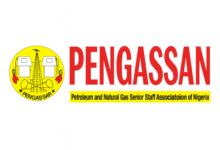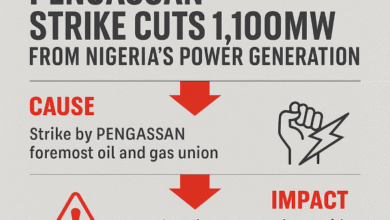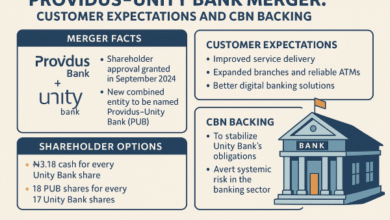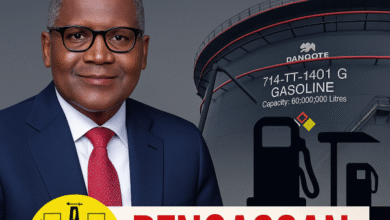Nigeria-Siemens electricity deal to gulp over N1.15tn

Germany-based Siemens AG and the Nigerian Government signed a six-year electricity deal in July and will cost more than N1.15tn to execute.
The three-phase Nigerian electrification project which aims to achieve 25,000 megawatts of electricity in the country by 2025 will require more than N1.15tn to execute, according to the Technical and Commercial Proposal seen by our correspondent.
According to Punch, On July 22, 2019, the Federal Government and Siemens signed a Letter of Agreement on the Nigeria Electrification Roadmap which resulted from the meeting between President Muhammadu Buhari and the German Chancellor, Angela Merkel, on August 31, 2018 in Abuja.
President Buhari said at the signing ceremony that it was evident that more work needed to be done to upgrade the transmission and distribution system, adding that the government was initially reluctant to intervene as the distribution sector had already been privatised.
According to the Technical and Commercial Proposal dated May 7, 2019, phase 1 of the project seeks to increase power delivered by additional 2,000MW, significantly reduce Aggregate Technical, Commercial and Collection losses and achieve improved grid stability and reliability.
The document revealed that the scope of work for the first phase would entail transmission assets upgrade, distribution assets upgrade, grid automation, national metering infrastructure, power system simulation and general technical training.
The budgetary price for the transmission assets upgrade, which includes 11 containerised substations and 10 mobile substations, was put at €330m (about N113.42bn).
The cost of the distribution assets upgrade was estimated at €250m (N85.92bn). The upgrade would include products and systems for 14 stations and upgrade of 26 substations.
According to the document, the power system simulation would entail new software licences for the Transmission Company of Nigeria (€192,000); software M&S for TCN (€182,000); training and technical services support for TCN (€1.35m); new software licences for 11 distribution companies (€1.41m); software M&S for Discos (€848,000) and training and technical services support for Discos (€1.81m).
READ ALSO: TCN to overlook N270bn debts owed by Discos
The cost of system development studies for 25,000MW transmission, sub-transmission and distribution grid capacity was put at €1m.
The budgetary prices for the grid automation, national metering infrastructure and the general technical training were not stated.
“The quantity and prices are all ex-work factory and are subject to change after detailed project scoping and design. Budget prices contained here exclude the following: i. Taxes, duties and other logistics costs ii. Project management costs iii. Costs of rights of way, Environmental and Social Impact Assessment, Environmental Impact Assessment, and other required licences or permits,” the document said.
According to the proposal, the objective of second phase is to increase the grid capacity from 7,000MW (expected to be realised from phase 1) to 11,000MW.
To achieve this, Siemens and other participants will focus on transmission and distribution assets upgrade including North East Transmission Infrastructure Projects 2; supervisory control and data acquisition for Discos; 40MW embedded power project in Abuja, and gas processing projects to ensure fuel availability
“Siemens proposes a gas processing facility for 300 million standard cubic feet per day from existing flare gas assets for the generation of about 1,200MW of electricity within 36-48 months,” the document said.
It said the budgetary price estimates for the distribution SCADA for the 11 Discos and gas processing to power projects would be submitted later.
The 40MW embedded power project was estimated to cost $770 — $815 per kilowatt, depending on the scope of supply and location, among others, amounting to about $31.68m (N9.72bn).
The proposal also disclosed that the third phase of the Nigeria Electrification Roadmap would focus on additional transmission and distribution assets upgrade and large-scale power project in order to increase the grid capacity from 11,000MW to 25,000MW.
On new power generation to support central and northern regions, the document said, “The Nigerian National Petroleum Corporation is already in the process of developing the Ajaokuta-Kaduna-Kano Pipeline Project and the establishment of power plants in Abuja, Kaduna, and Kano states.
“Siemens is happy to support the power plant projects, particularly to speed up this process to build new power capacity in northern region and Lagos area of Nigeria.”
According to the document, the potential projects are 1,350MW in Abuja; 1,350MW, Kaduna; 1,350MW in Kano, and 450MW in Lagos (Agura).
The budgetary cost of the Abuja, Kaduna and Kano projects was put at an average of €700/kW, while that of Lagos was €600/kW, amounting to about €3.11bn ( N1.07tn).
“These above prices are subject to changes based on additional information on the specific projects, location, financing and contractual terms and conditions,” the document said.
It said that additional projects such as Independent Power Producer projects would be required to close the capacity gap to 25,000MW.
“These projects could be, for example, in the Lagos region or any other location where demand for additional power is especially high,” it added.
The President and Chief Executive Officer, Siemens, Mr Joe Kaeser, who visited Nigeria last month for the signing of the deal, had said the contractual and financial agreement would be discussed in the next few weeks to enable the project started quickly.
The Director-General, Lagos Chamber of Commerce and Industry, Mr Muda Yusuf, in a recent interview with our correspondent, described the liquidity challenge in the sector as a major issue in the power sector.
“For me, the project is not ambitious enough, given the acute power problem that we have in Nigeria. I think we should be more ambitious when we are talking about our aspirations as far as the power sector is concerned. But more importantly, we need to fix the fundamental issues before what is being discussed can crystallise,” he said.
Yusuf cited the issues of tariff, technical and financial capacity of Discos and unpaid debts in the entire value chain of the sector.
The Nigeria Electrification Roadmap is similar to the Egypt megaproject and the Iraq electrification project recently awarded to Siemens.
In July, 2018, Siemens announced the completion of the Egypt Megaproject in record time, adding 14,400MW of power generation capacity in 27.5 months to Egypt’s national grid.
On April 30, 2019, Iraq and Siemens signed a framework agreement to upgrade the electricity grid of the country.
Yetunde Adegoke











